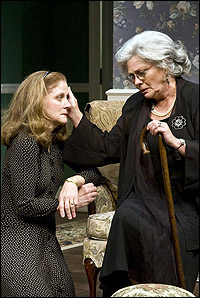
*
Few actresses this side of Geraldine Page can say "Yes" and pull three syllables out of those three letters. But the woman playing Emily in Horton Foote's The Day Emily Married did just that in her first word when the play opened at Primary Stages in 2004. Her long, lazy twang screamed Harrison, TX — the fictional facsimile of Foote's hometown of Wharton, TX.
The actress behind this feat is herself a Foote — the author's daughter, Hallie — born in Manhattan 55 years ago and brought up "northern" in Nyack and New Hampshire. "I've never lived in Texas," Hallie'll have you know — despite the geographic specificity of her inflection — but she has accompanied her father on many a sentimental journey home and been exposed to the front-porch patois of the natives, many of whom have been grist for her dad's theatrical mill. Each trip entails a stop at the local graveyard to assess the latest ravages of time. "He'll stand there and say, 'I'm the last.' There's not many of his generation left — and certainly not many of the family he knew."
At 92, Horton Foote may well be the oldest living playwright still presenting new work on Broadway. Dividing the Estate, which Lincoln Center Theater and Primary Stages have brought to the Booth, is his eighth Main Stem entry — and his first since his 1995 Pulitzer-winning The Young Man From Atlanta. It is also the first time he has presented his pride 'n' joy on Broadway, so he outfitted her in a scene-stealing role.
Actors' Equity already flagged Hallie for Tony attention with its Richard Seff Award — for the best supporting performance by a character actor 50 or older — when Estate bowed Off-Broadway last year. Standing out in this standout company is something. Written at the time it's set — during the financial upheaval of 1987, when the savings and loan crisis caused land values and oil prices to plummet — Dividing the Estate is a domestic comedy (now grimly topical) about a Texas clan mud-wrestling over the family money, real or imagined. Stella Gordon, a silver-haired matriarch (Elizabeth Ashley), and her square-shootin' grandson (Devon Abner), who manages the estate and is known to one and all as "Son," are belligerently besieged for early inheritances by the generation in between, all of them feeling the pinch of hard times: Mary Jo (Hallie), who moved from Little H (Harrison) to Big H (Houston) and lived too high on the hog; her fluttery stay-at-home sister, Lucille (Penny Fuller); and their boozing, gambling brother, Lewis (Gerald McRaney).
Round and round they go, like the Hubbards of The Little Foxes or the Pollitts of Cat on a Hot Tin Roof — only funnier. Not only does Hallie not get in the first word, she enters the fray late — 38 minutes into the play. But she makes up for lost time, digs in her heels and barely bothers to mask her machinations and her sell-sell-selfishness.
| |
 |
|
| Hallie Foote in Dividing the Estate with Elizabeth Ashley | ||
| photo by James Leynse |
"I admire Mary Jo. There's a straightforward quality to her. She does what she thinks. I like that. I don't think she's nasty at all. Money is a great leveler. It's the thing that can terrify people, and Mary Jo is a survivor. She's highly pragmatic. She loves her husband and her kids, and she will do whatever it takes to make it work."
The actress in her has fun playing a spiky, spiteful person at the same time she's trying to hide it. The trick, she believes, is to come to characters sympathetically and show the needs that govern their deeds. "I think you have to do that. Otherwise, you end up resenting what you're doing. I always try to find a way to redeem a person."
Mary Jo needs redemption more than most, but Hallie knows her way around these Foote hills and valleys by now and can apply human makeup to glaring blemishes. She has been at it a quarter of a century, and, although she does do other authors, she's considered the foremost interpreter of her father's work — his in-house voice.
She's the keeper of other flames as well. Abner, who plays her nephew in the play, is in real life her husband and a screenwriter. Donning her producer's hat, Hallie is planning a movie of My Father's Song, his script about composer Charles Ives. Her sister, Daisy Foote, who has written two plays that Hallie appeared in, is also a screenwriter. Her latest project is The Church of the Dead Girls, which Ted Hope will produce. Then there is The Widow Claire, which Hallie played Off-Broadway in 1986 and is now trying to produce as a film with a new widow Claire. The project was on Robert Altman's plate before he passed away, and now James Ivory has taken over the direction. Chances are you'll see it onstage first, it being one of the nine plays constituting Foote's juggernaut, The Orphans' Home Cycle. The playwright and his current director, Wilson, are sculpting and condensing all nine into a Coast of Utopia-type saga that will launch at Wilson's Hartford Stage Company in the 2009 season.
That should keep "Daddy's best girl" spinning plates for a spell. Ye-e-esss!


Evan-Zimmerman-for-MurphyMade.jpg)


Evan-Zimmerman-for-MurphyMade.jpg)




